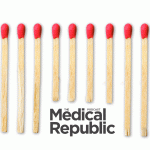The ever-present risk has been heightened by the events of 2020, but there are ways to get through.
If you’re feeling exhausted and have been experiencing more than your usual level of cynicism about work, who could blame you?
Since the beginning of the year, GPs around Australia have dealt with the health effects of drought, bushfires and the ongoing COVID-19 pandemic.
And despite all the changes these disasters have triggered in GPs’ personal and professional lives, clinicians have still been required to show up to work every day, and treat a number of run-of-the-mill health complaints too.
Speaking at the GP20 conference at the weekend, Dr David Oldham, Associate Professor Louise Stone and Dr Amy Imms said given the stress of 2020, GPs were at a high risk of experiencing chronic workplace stress that if not managed, could lead to burnout.
Dr David Oldham, medical director at the Doctors Health Advisory Service Western Australia, said burnout was classified as a syndrome resulting from chronic workplace stress that has not been successfully managed, analogous to an individual developing a repetitive strain injury.
“It’s when people give too much for too long, and receive too little in return,” he said.
One of the more common ways to assess burnout is by using the Maslach Burnout Inventory.
The Maslach tool describes three areas of burnout including emotional exhaustion, deep personalisation and cynicism and a lack of professional efficacy.
Dr Oldham said for GPs, work related factors play a big part in these areas of concern.
“GPs who see a new patient every ten minutes have to switch off from one patient, switch on to another patient and of all the specialties, general practice is the most demanding in this way in terms of throughput,” he said.
“It can also be very emotional because psychological consults also make up about half of our consultations, so there’s a lot of pressure there.
“We’re also self-employed so we can’t just take time off whenever we want because we don’t get sick leave, and there’s a financial pressure to keep working.”
And working in general practice can also be very isolating.
Many GPs find they can work all day in the same practice as half a dozen other doctors, and not talk to them all day.
Dr Imms, founder of the Burnout Project, said doctors need to be aware of burnout because it decreases the quality of care that is provided to patients and reduces the moral of others in the workplace.
One of the first strategies to avoid burnout, is for doctors to set boundaries in their practice.
“We need to think about how we structure our bookings, how long we see people for, and communicate with reception staff to make sure they are on board with making sure those bookings are working well,” Dr Imms said.
GPs should also reflect on the fees they charge, because the way doctors are renumerated often feeds back into how valued they feel.
Another piece of advice was to work out what could be delegated to other people in the workplace where appropriate, including reception staff, nursing staff and other GPs in the practice, Dr Imms said.
“If you feel you are burning out, don’t be afraid to go see your own GP, or someone who is specialised in burnout, because often we are good at helping others, but we always forget to help ourselves,” she said.
Professor Stone said part of getting yourself out of a state of burnout might also come down to making a bold decision about your career.
Many people in medicine feel pressured to stay in a single clinical career, but others have found more happiness by moving to other parts of the profession, or through leaving medicine entirely, Professor Stone said.
“Part of thriving in general practice is to find the environment that you are able to give and receive the best you can and be the best GP that you can be – and that might lie either inside or outside the profession.”
Watch the full GP20 presentation here.





